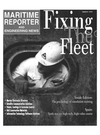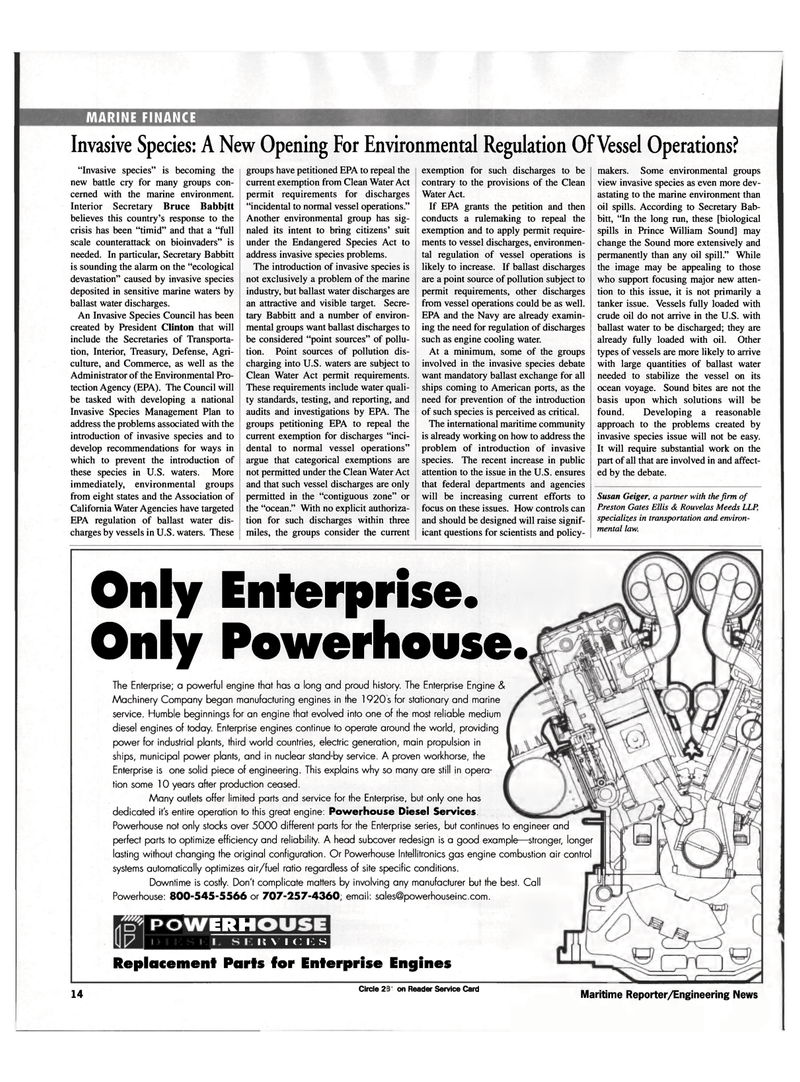
Page 14: of Maritime Reporter Magazine (March 1999)
Read this page in Pdf, Flash or Html5 edition of March 1999 Maritime Reporter Magazine
MARINE FINANCE
Invasive Species: A New Opening For Environmental Regulation Of Vessel Operations? "Invasive species" is becoming the new battle cry for many groups con- cerned with the marine environment.
Interior Secretary Bruce Babbitt believes this country's response to the crisis has been "timid" and that a "full scale counterattack on bioinvaders" is needed. In particular, Secretary Babbitt is sounding the alarm on the "ecological devastation" caused by invasive species deposited in sensitive marine waters by ballast water discharges.
An Invasive Species Council has been created by President Clinton that will include the Secretaries of Transporta- tion, Interior, Treasury, Defense, Agri- culture, and Commerce, as well as the
Administrator of the Environmental Pro- tection Agency (EPA). The Council will be tasked with developing a national
Invasive Species Management Plan to address the problems associated with the introduction of invasive species and to develop recommendations for ways in which to prevent the introduction of these species in U.S. waters. More immediately, environmental groups from eight states and the Association of
California Water Agencies have targeted
EPA regulation of ballast water dis- charges by vessels in U.S. waters. These groups have petitioned EPA to repeal the current exemption from Clean Water Act permit requirements for discharges "incidental to normal vessel operations."
Another environmental group has sig- naled its intent to bring citizens' suit under the Endangered Species Act to address invasive species problems.
The introduction of invasive species is not exclusively a problem of the marine industry, but ballast water discharges are an attractive and visible target. Secre- tary Babbitt and a number of environ- mental groups want ballast discharges to be considered "point sources" of pollu- tion. Point sources of pollution dis- charging into U.S. waters are subject to
Clean Water Act permit requirements.
These requirements include water quali- ty standards, testing, and reporting, and audits and investigations by EPA. The groups petitioning EPA to repeal the current exemption for discharges "inci- dental to normal vessel operations" argue that categorical exemptions are not permitted under the Clean Water Act and that such vessel discharges are only permitted in the "contiguous zone" or the "ocean." With no explicit authoriza- tion for such discharges within three miles, the groups consider the current exemption for such discharges to be contrary to the provisions of the Clean
Water Act.
If EPA grants the petition and then conducts a rulemaking to repeal the exemption and to apply permit require- ments to vessel discharges, environmen- tal regulation of vessel operations is likely to increase. If ballast discharges are a point source of pollution subject to permit requirements, other discharges from vessel operations could be as well.
EPA and the Navy are already examin- ing the need for regulation of discharges such as engine cooling water.
At a minimum, some of the groups involved in the invasive species debate want mandatory ballast exchange for all ships coming to American ports, as the need for prevention of the introduction of such species is perceived as critical.
The international maritime community is already working on how to address the problem of introduction of invasive species. The recent increase in public attention to the issue in the U.S. ensures that federal departments and agencies will be increasing current efforts to focus on these issues. How controls can and should be designed will raise signif- icant questions for scientists and policy- makers. Some environmental groups view invasive species as even more dev- astating to the marine environment than oil spills. According to Secretary Bab- bitt, "In the long run, these [biological spills in Prince William Sound] may change the Sound more extensively and permanently than any oil spill." While the image may be appealing to those who support focusing major new atten- tion to this issue, it is not primarily a tanker issue. Vessels fully loaded with crude oil do not arrive in the U.S. with ballast water to be discharged; they are already fully loaded with oil. Other types of vessels are more likely to arrive with large quantities of ballast water needed to stabilize the vessel on its ocean voyage. Sound bites are not the basis upon which solutions will be found. Developing a reasonable approach to the problems created by invasive species issue will not be easy.
It will require substantial work on the part of all that are involved in and affect- ed by the debate.
Susan Geiger, a partner with the firm of
Preston Gates Ellis & Rouvelas Meeds LLP, specializes in transportation and environ- mental law.
Only Enterprise.
Only Powerhouse.
The Enterprise; a powerful engine that has a long and proud history. The Enterprise Engine &
Machinery Company began manufacturing engines in the 1920s for stationary and marine service. Humble beginnings for an engine that evolved into one of the most reliable medium diesel engines of today. Enterprise engines continue to operate around the world, providing power for industrial plants, third world countries, electric generation, main propulsion in ships, municipal power plants, and in nuclear stand-by service. A proven workhorse, the
Enterprise is one solid piece of engineering. This explains why so many are still in opera- tion some 10 years after production ceased.
Many outlets offer limited parts and service for the Enterprise, but only one has dedicated it's entire operation to this great engine: Powerhouse Diesel Services.
Powerhouse not only stocks over 5000 different parts for the Enterprise series, but continues to engineer and perfect parts to optimize efficiency and reliability. A head subcover redesign is a good example—stronger, longer lasting without changing the original configuration. Or Powerhouse Intellitronics gas engine combustion air control systems automatically optimizes air/fuel ratio regardless of site specific conditions.
Downtime is costly. Don't complicate matters by involving any manufacturer but the best. Call
Powerhouse: 800-545-5566 or 707-257-4360; email: [email protected].
EE i-M lam i« v i c i : s
Replacement Parts for Enterprise Engines 14 Circle 243 on Reader Service Card Maritime Reporter/Engineering News

 13
13

 15
15
